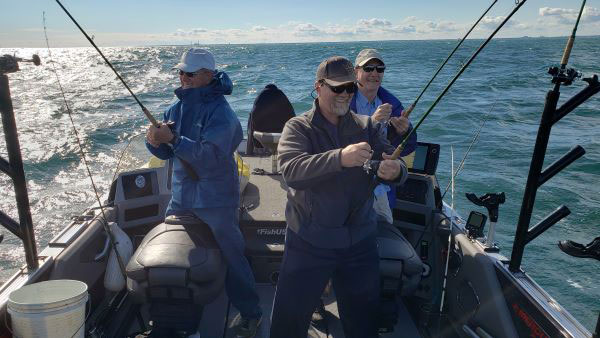- Details
- Details
Mercury Report
 Fishermen on an offshore trip
Fishermen on an offshore trip
Aside from maybe a thunderstorm, nothing can spoil a fun day on the water faster than a bout of seasickness. Though seasickness is mainly a problem in choppy seas and big water, it can crop up in surprisingly calm conditions because of the constant motion of the boat rocking on the surface. It’s something that even experienced boaters must deal with from time to time.
But there’s good news. According to Mercury Pro Team member Ross Robertson, who’s been helping clients deal with seasickness for 20 years while operating his Bigwater Fishing guide service on the Great Lakes,most boaters can minimize or avoid symptoms by taking some simple preventive measures.
The Cause and Symptoms
Seasickness occurs when constant motion causes the eyes, body muscles and parts of the inner ear that control balance to send mixed signals to the brain. The resulting “confusion” of senses about whether the body is in motion or stationary can lead to seasickness symptoms.
Seasickness affects everyone differently, but common symptoms include nausea, dizziness, pale skin, headache, fatigue and heavy perspiration. Certain health conditions or disturbances to the inner ear can make it worse. Severe cases can even cause people to faint, vomit or become so ill that they need to head back to shore immediately.
Though many of the symptoms aren’t obvious to other passengers, it’s important to know what to look for to help everyone have an enjoyable outing.
“You’ll notice someone sweating, or they’ll have a pale face,” Robertson said. “But the No. 1 sign is they just retreat. They don’t talk anymore. They’re up on the front deck being really quiet and want someone else to reel fish in. They quit fishing. Usually, at that point, I offer a bottle of water and ask them what’s up because I know they’re in bad shape.”
Preventing Seasickness
While natural remedies such as ginger and mint are said to help prevent seasickness, most boaters use over-the-counter treatments containing the antihistamine dimenhydrinate when needed. Be advised that some seasickness medications can cause drowsiness. Other boaters prefer special wristbands that apply pressure to acupressure points to help reduce the symptoms. For people who suffer from severe symptoms, doctors might even prescribe motion sickness patches that are worn on the skin. (Always consult your doctor if you have any questions about medical treatments, or if you’re taking other medications or have certain medical conditions that might not allow you to take dimenhydrinate.)
Regardless of the treatment used, the best way to avoid symptoms is to get in front of seasickness before it starts.
“I know seasickness after 20 years of dealing with people on the water for 200 days per year,” said Robertson. “A lot of it’s preventable. Don’t be hungover. Don’t be dehydrated. Some problems start when people have too much fun the night before.”
Robertson suggests taking seasickness medications before bed the night before boating, which helps avoid grogginess that might result from taking it in the morning before an outing. Just be sure to follow the recommendations provided with the medication.




